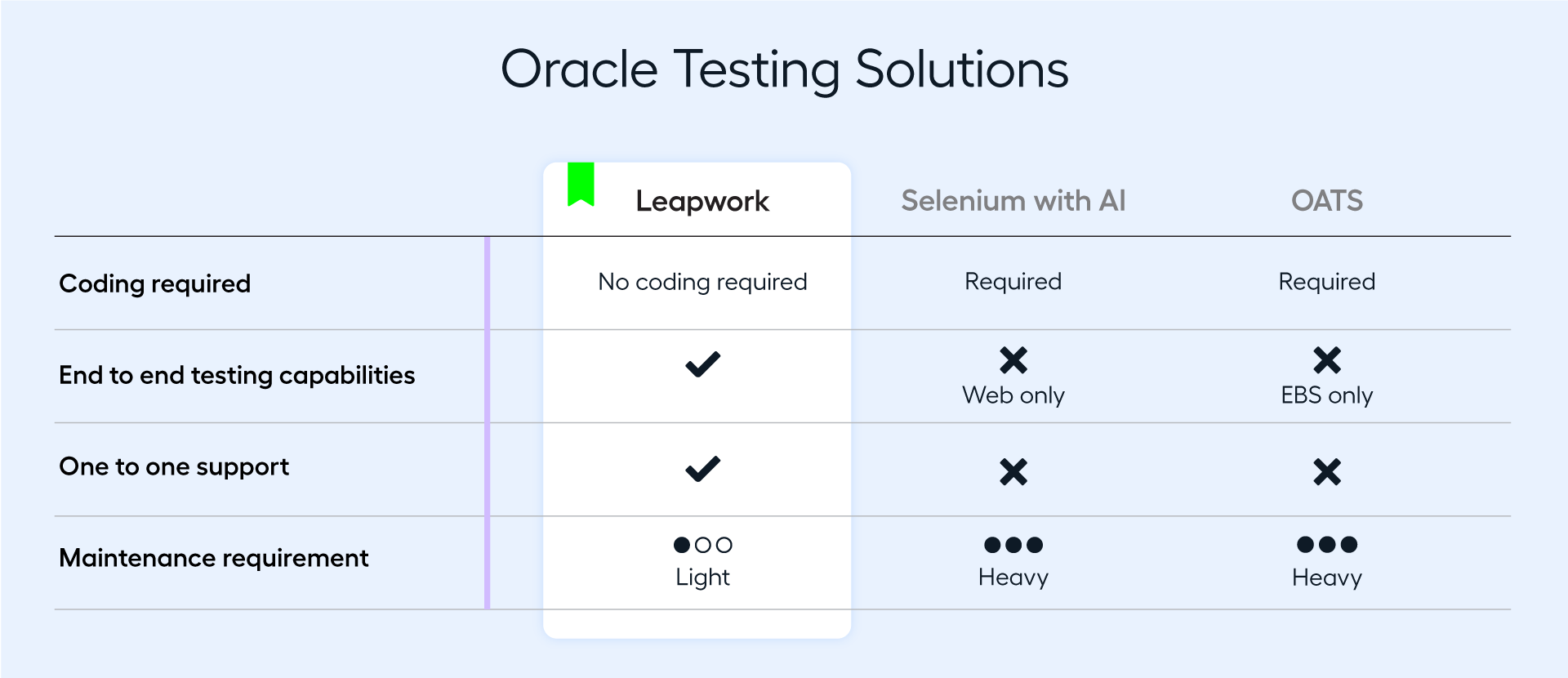OATS Testing Tool vs Selenium vs Leapwork: How to choose your Oracle testing solution
OATS Oracle is only available for testing E-Business Suite (EBS). This presents a problem - for test automation to be truly effective, you need a solution that works across Oracle and your technology stack. If you are in the process of searching for alternative solutions, you’ve come to the right place.
When researching options for a test automation tool for Oracle, there are a number of things to consider, such as what capabilities the tool should have and if the tool should be open-source or licensed.
In this article, we’ll detail a complete overview of three Oracle test automation tools along with their pros and cons to give you a better understanding of your options.
The tools:
- Selenium: Free, code-based automation tool
- Oracle Application Testing Suite (OATS): Oracle's own automation tool
- Leapwork: A codeless Selenium alternative
If you haven't already, read our whitepaper on automating Oracle to learn about types of Oracle automation and what to look for when researching Oracle automation tools.
OATS testing tool vs Selenium vs Leapwork
In this section, we describe the capabilities of Oracle OATS, Selenium and Leapwork to help you find the right Oracle testing solution. In each section, you’ll find the following information:
- Coding requirement: Tools that require coding rely on specialist resources that are expensive and difficult to find.
- End to end testing capabilities: If you’re using Oracle, you're probably using other software too. Make sure your testing solution works across your tech stack, not just Oracle.
- One to one support: Testing solutions aren’t always straight forward - does the solution have dedicated people on board to help you when you hit a road bump?
- Maintenance requirement: Tools requiring heavy coding often need more maintenance than the time it takes to build a test.
Don’t have the time to read the full post? Here are the basics:

Selenium
Selenium test automation is a highly popular tool for automating web elements, automating tasks, and testing web applications. The Selenium automation suite consists of several tools, including WebDriver, Selenium IDE (a record-and-play tool), and Selenium Grid (for parallel testing).
Selenium pros
- Free and open-source
- Large community of users
- Supports web GUI testing
Selenium cons
- Coding is required for test set up and maintenance. This makes testing tedious and time-consuming - particularly if your Oracle system is highly customized.
- Only works with browser-based applications. You won’t be able to automate across any desktop-based Oracle applications or other non-web technologies integrated with Oracle.
- No test reporting or troubleshooting capabilities, making failed tests difficult and time-consuming to fix.
- No fast and targeted professional help if you run into technical problems, which can be a deal-breaker for enterprises dealing with sensitive operations.
- Oracle web applications run on Internet Explorer (IE), and Selenium’s IE driver isn’t stable enough for thorough testing.
Summary
- Coding requirement: Yes
- End to end testing capabilities: No, web-only
- One to one support: No, only community support
- Maintenance requirement: Heavy
Oracle Application Testing Suite (OATS)
Oracle has its own test automation tool - Oracle Application Testing Suite (OATS). It is considered a legacy testing solution, however it is still possible to download OATS.
OATS pros
- In-built record and playback tool.
- Automates testing of Oracle EBS.
- In-built automation components which eases test design and set-up processes.
- Additional features such as scheduling for regression testing and test data creation.
OATS cons
- Test cases require coding (Java) for editing and maintenance.
- Limited in its cross-technology functionality, and it will only allow you to automate Oracle EBS.
- There have been no major release updates to OATS since 2017, meaning there is limited support for the tooling.
- Requires additional automation tools to achieve complete test coverage and to have full end-to-end testing, a requirement in most enterprise organizations.
Summary
- Coding requirement: Yes (for editing and maintenance of recorded tests)
- End to end testing capabilities: Only for EBS
- One to one support: Limited support since 2017
- Maintenance requirement: Heavy
Leapwork
Leapwork enables faster build, maintenance and scalability of test automation. It is an enterprise solution that is entirely visual, meaning that you can tackle your complex and most critical Oracle test cases without having to learn or touch code.
See the video below for an example of how Leapwork automates test cases compared against Selenium.
Leapwork pros
- Users can build, maintain and scale test automation across technologies, and across all Oracle-based applications.
- An entirely visual interface. Tests are automated without touching code for easier and speedier set up and maintenance. This lets teams overcome the most common challenges in automating tests, saving you time with every release.
- Robust GUI controls recognition aids in element location in Oracle Forms even when elements slightly change, reducing maintenance needs over time.
- In-built IE capabilities make it possible to automate Oracle Forms.
- On-demand support with in-house QA and test engineering experts.
- Increases QA productivity. The average user ramps up in less than 30 days.
See how this Multinational Bank saves 150 hours per Oracle release with automated testing.
Leapwork cons
- A premium solution. However, there is a quicker time to value, better ROI over time, and tests are simpler to maintain compared to other vendors, specifically Selenium and OATS.
Summary
- Coding requirement: No - uses a visual language
- End to end testing capabilities: Yes - supports cross-technology testing
- One to one support: Yes - dedicated professional services
- Maintenance requirement: Low
Conclusion
Conventional Oracle automation requires a sophisticated understanding of the Oracle technology stack as well as programming languages - a problem that no-code solves.
However, if you still need to do more research, download our comparison chart that compares Leapwork to other top test automation tools.
